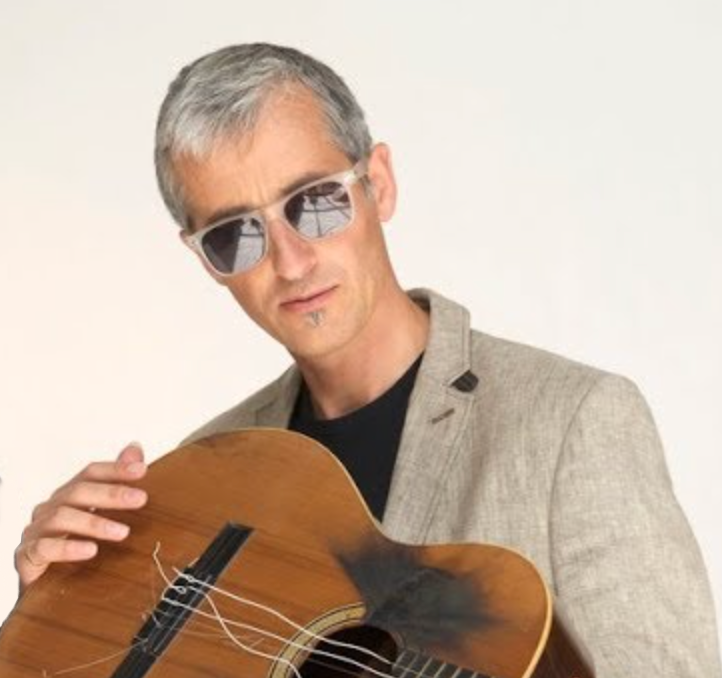Nomination by Dimi Dumortier
Born in Dinant (Belgium) in 1977, Quentin Dujardin entered the world of classical music very early with his father, who was an unconditional fan of organ music (Bach, Franck, Messiaen, Duruflé, etc.). Quentin was a faithful student at the local music school where he studied guitar, music theory, music history and chamber music.
The discovery in his father’s mostly classical music library of an album by Philip Catherine, the famous Belgium jazz guitarist was a pivotal moment for Quentin. His serious exploration into jazz began at the age of 15. When he was 22, he recorded his first album entitled La Fontaine de Gore named after the street he was brought up on. Graduating in jazz en light music, he continued a further year to study film music composition at the Ghent Conservatory.
Quentin Dujardin is a modern day nomad, who travels alone with his classic guitar. From Gnawas (Morocco) to Andalucian Gypsies (Spain) passing by Vezos (Madagascar) or even Guaranis (Paraguay), his way of life connects this movement to delicate production based on listening and mixing sounds from around the world. In this way Quentin Dujardin gives himself the pleasure of accumulating experiences with the same rigor: total devotion to his art. Thus, to discover the range of this guitarist remains a unique experience for everyone because the roads that lead you to him may be many. Yet there remains something immutable that touches and marks his world of the guitar with an indelible imprint: sound and emotion.
He collaborated with the Belgian harmonicist Toots Thielemans and with the American producer Lee Townsend but also worked live or in studio with Manu Katché, Bijan Chemirani, Nicolas Fiszman, Ivan Paduart, Olivier Ker Ourio, Mahsa Vahdat, Richard Bona, Bert Joris, Kevin Seddiki and many other great musicians.
Guitarist Magazine referred to him stating, “This artist is a sumptuous invitation to voyage.” Toots Thielemans said about him, “Quentin is to me a revelation.”
Since 2003 he has performed more than 800 concerts throughout Belgium and internationally (France, Spain, Luxemburg, Switzerland, Madagascar, Morocco, Canada, Paraguay, Estonia,etc.).
In 2008, The French director Freddy Mouchard made a documentary movie Sur le Chemin (77:00) about his way of living music around the world. The movie was selected by the World film Festival 2009 of Tartu (Estonia) and the Festival Cinéma Méditerranéen de Bruxelles 2008. His album Veloma is the original soundtrack from the movie.
For someone like Quinten, who lives from his travels, the corona crisis was a devastating blow. In his eyes, sharing his music is a religion. Deprived of his art for almost a year, Quentin Dujardin decided on February 14, 2021 to give a concert in a church, respecting the strict conditions imposed on worship. All the legal consequences were thoroughly considered. A few days before the concert, the police called him and threatened to arrest him and to impose a fine 11.000 euro on him and the organizer. When he replied he would give the concert anyway, the baffled chief of police, who realized that this concert was in the first place a political action, started to dialogue. In the end, the policeman and the guitarist agreed on the following scenario: Dujardin would be allowed to organize the event. The public would be limited to 15 people. Journalists and camera’s would be granted full access. Then Dujardin would play one piece of music, after which the police would stop the concert, asking the guitarist for his identity card.
The guitarist was summoned to court a few weeks later but was fully acquitted. The judge said it is illegal and discriminating to allow religious services for 15 persons but to forbid concerts for the same amount of people.
Here is a very poignant interview with him (Un Musicien se Révolte, Kairos) where he elaborates his ideas on cultural identity, his anger towards the apathy of political institutions vis-à-vis the constitutional crime of deprivation of cultural expression and pointing out that things are to change for the better or he and his people will have to start organizing a different sort of counter events to come….

